PEP五年级英语上册重点单词和句子
2023年人教版(PEP)五年级英语上册总复习要点

五年级英语上册总复习要点PEP英语五年级上册四会单词词汇表Unit 1:young 年轻的 funny 滑稽可笑的tall 高的 strong 强壮的kind 和蔼的old 年老的helpful 有用的thin 瘦的Mr 先生like 像、喜欢strict 严格的clever 聪明的 polite有礼貌的quiet 安静的Unit 2:Mondy 星期一Tuesday 星期二Wednesday 星期三Thursday 星期四Friday 星期五Saturday 星期六Sunday 星期天have 有、吃 on 在…..时候do homework 做作业watch TV 看电视read books 读书wash my clothes洗我的衣服play football踢足球Unit 3:三明治 sandwich fish 鱼salad 沙拉冰激淋 ice cream potato 土豆tomato 西红柿for 为lunch 中餐sweet 甜的hot辣的fresh 新鲜的favourite 最喜欢的fruit 水果healthy健康的delicious可口的tea茶五年级上册四会句子:1.谁是你的英语老师?王老师。
Who’s your English teacher?Mr Wang .2.他长得什么样?他(是)高而强壮。
What’s he like ?He’s tall and strong . 3.她很安静吗?不是的。
她很活跃的。
Is she quiet ?No, she isn’t. She’s very active.4.她很严格么?是的,但她很和蔼的。
Is she strict ?Yes, she is , but she’s very kind .5 今天星期几?星期二。
What day is it today ?It’s Tuesday.6 星期二你们上什么课?What do you have on Tuesdays ?7 我们上数学和科学课。
pep小学五年级英语上册知识点汇总(已整理)

五年级上册知识汇总Unit 1一.单词:young年轻的funny滑稽可笑的tall高的 strong强壮的kind和蔼的,亲切的old年老的 short矮的 thin瘦的who’s = who is Mr先生like像、喜欢what’s = what is he’s = he is principal校长 university student大学生strict 严格的smart聪明的、巧妙的active积极的、活跃的very 很、非常but但是quiet安静的;文静的she’s = she is二. 句子:1.A:Who’s your English teacher ? 你的英语老师是谁?B:Mr Carter. 卡特先生.2. He’s from Canada. 他来自加拿大.3. A:What’s he like ? 他什么样?B: He’s tall and strong . 他又高又壮.He’s very funny. 他很滑稽.〔Who,What引导的特殊疑问句,用来对不熟悉的老师进行问答:Who's + 某人?What's he / she like? He / She is + 与身体特征和性格特征有关的形容词.)4.A: Who’s that young lady/? 那个年轻的女士是谁?B:She’s our principal.她是我们的校长.5.I have a new math teacher. 我有一位新数学老师.6.Her class is so much fun. 她的课非常有趣.7.She’s a university student. 她是一名大学生.8. A: Is she quiet ? 她很安静吗?B: No, she isn’t. She’s very active. 不是的.她很活跃的.〔Is引导的一般疑问句,谈论某位老师是否具有某方面的特征:Is he / she + 与身体特征和性格特征有关的形容词,回答用:Yes, he / she is. No, he / she isn't. )9. A:Is she strict ? 她很严格么?B:Yes, she is , but she’s very kind . 是的,但她很和蔼的.三. 语法:1、动词的第三人称单数:〔当一个句子中的人物是第三人称单数,并且这个句子又是一般现在时态时,该句子中的动词要使用第三人称单数形式.〕have—has like—likes do—does go—goes watch--watches2、词语变化:fun(形容词形式)――funny funny〔名词形式〕――funknow(同音词)――no反义词:tall—short long—short young—old strong—thinactive—quiet kind—strict active—quiet3、be like与do like: 在本单元中,What’s …like?的句型是主句型,这里的like 是“像…一样”的意思. What’s …like?是问某某长得什么样子.它的答语一般用:He/She/ It is…(后面跟描写人的外貌特征的词语),如:What’s your father like?你爸爸长得什么样子?.而在do like的句子中,like的意思才是“喜欢”的意思.如:What does your father like? 你爸爸喜欢什么?4 Mr—先生Miss —小姐〔未婚〕Mrs—夫人,女士〔已婚〕四.语音:字母组合:ea peach tea seat jeans字母组合:ee beef sheep queen sleepUnit2一.单词:Monday〔Mon.)星期一Tuesday〔Tue.) 星期二 Wednesday(Wed.) 星期三Thursday〔Thu.) 星期四Friday〔Fri.) 星期五 day天;日子have有;吃on 在……时候do homework做作业watch TV 看电视 read books读书 Saturday〔Sat.)星期六Sunday〔Sun.)星期日What about…?……怎么样?too也;太二.句子:1 A: What day is it today ? 今天星期几?B: It’s Wednesday. 星期三.2. A: What do you have on Thursdays ? 星期四你们有什么课?B: We have English, math and science on Thursdays.在星期四我们有英语,数学和科学课.3. I like Thursdays. 我喜欢星期四.4.A:What do you do on Saturdays ? 星期六你常常做什么?B: I often do homework, read books and watch TV.我经常做作业,读书,看电视.5. A: What about you ? /And you? 你怎么样?/你呢?B: I do my homework, too. 我也做作业.三. 语法:1、当介词in, on ,at 后面跟表示时间的词语时,表示在某年或某月〔当只有年和月的时候〕,用in.如in May在五月.In 1988,在1988年.表示在某段时间,如在上午,下午,晚上也用in.如in the morning, in the afternoon, in the evening. 表示在某日,在星期几时,用on.如on Monday, on Sunday . 表示在几点几分,在具体时间时,用at. 如at 6:30, at 9 o’clock.2. I like Mondays. John likes Sundays. 这里的likes是like的第三人称单数形式,在一般现在时的句子中,如果主语是第三人称单数,注意动词要变成三单形式.3、理解、区分这两个句型A: What do you have on Mondays?〔每逢周一你们都有什么课?)B: We have Chinese, English, math and science on Mondays.A: What do you do on Mondays? 〔每逢周一你都做什么?)B: I often do homework, read books and watch TV.四.语音:字母组合:ow how town brown now字母组合:ou our mouth mountain houseUnit3一.单词:cabbage洋白菜;卷心菜pork 猪肉mutton羊肉eggplant茄子fish 鱼green beans青豆tofu 豆腐potato土豆tomato西红柿for为;给 lunch中餐we我们healthy健康的;有益健康的tasty好吃的sweet甜的sour酸的fresh新鲜的salty 咸的 favourite最喜欢的they’re = they are fruit水果grape葡萄don’t = do not 不;非第三人称单数的否定形式二.句子:1.A: What would you like for lunch? 午饭你想吃什么?B: I’d like some tomatoes and mutton.我想吃西红柿和羊肉.2. A: What do you have for lunch on Mondays?星期一你们午饭吃什么?B: We have tomatoes,tofu and fish.我们吃西红柿,豆腐和鱼.3.A: What’s your favourite food? 你最喜欢的食物是什么?B: Fish. 鱼.4.A: What’s your favourite fruit ? 你最喜欢的水果是什么?B: I like apples . They are sweet. 我喜欢苹果. 它们是甜的.I like fruits. But I don’t like grapes. They’re sour.我喜欢水果. 但是我不喜欢葡萄. 它们是酸的.三. 语法:1、I have eggplant and tomatoes for lunch. 我午饭吃茄子和西红柿.这里的eggplant是指一道菜,是被切碎了的,熟的,所以这里的eggplant是不可数名词,不能用复数形式.西红柿tomato 和土豆potato 复数形式在后面加es tomatoes, potatoes fish 当表示为活的鱼的时候,是可数的,但它是单复数同形;当表示为鱼肉的时候,是不可数的.cabbage 当表示是一种包菜的数量时,是不可数名词,表示为cabbage;当表示不同种类的包菜时,是可数名词,表示为cabbageseggplant 当表示是未经过烹饪的蔬菜时,是可数名词,表示为eggplants;当表示经烹饪过的菜肴时,是不可数名词,表示为eggplant常见的肉类为不可数名词,pork mutton beef等2. 下列单词的形容词形式:health---healthy〔健康的〕taste---tasty〔好吃的〕3.What’ s y our favorite food? 后面一般都跟集合的名词:food 食物fruit水果drink饮料colour颜色class 课程book 书sport 运动vegetable 蔬菜number数字day天四.语音:字母组合:ow window yellow snow grow字母组合:oa coat boat goat roadUnit4一.单词:empty the trash倒垃圾cook the meals 做饭water the flowers浇花sweep the floor扫地clean the bedroom打扫卧室make the bed铺床set the table摆餐具wash the clothes洗衣服do the dishes洗碗碟put away the clothes收拾衣服can’t = cannot〔不会;不能〕use a computer〔使用计算机〕二.句子:1. I’m helpful! I can sweep the floor.我是有用的!我能扫地.2. A:Are you helpful at home?你在家有用吗?B: Sure. 当然.3.A: What can you do ? 你会干什么?B: I can sweep the floor.我会扫地.4. A: Can you do housework? 你能会家务吗?B: Yes I can.是的,我会No, I can't.不,我不会.5. A: Can you wash the clothes?你会洗衣服吗?B: No, I can't, but I'd like to have a try. 不,我不会,但我想试一试.6.A: Can you make the bed ? 你会铺床吗?B: No,I can’t. 不,我不会.7.A: Can you use a computer ? 你会使用计算机吗?B: Yes, I can. 是的,我会.三. 语法:1、当你想询问别人会干什么时,用What can you do? 答句有肯定形式:Yes, I can . 否定形式:No, I can’t.当你想知道他人会干什么时,可用What can he do ? 或者What can she do ? 答句有肯定形式:Yes, he can ./ Yes, she can. 否定形式:No, he can’t./No, she can’t.2、I can …变为一般疑问句:Can you …? He can…或She can …变为一般疑问句:Can he …/ Can she …? 其中的he , she 也可以变为其他具体的人物.如My mother can cook the meals. 变为一般疑问句:Can your mother cook the meals?3、help〔形容词形式)――helpful helpful〔动词形式)――help4、当句子中出现了情态动词can或其否定形式can’t时,其他的动词要用原形. 四.语音:or short fork horse stormall tall small ball hallUnit 5一.单词:air-conditioner空调curtain窗帘trash bin垃圾箱closet壁橱;衣橱mirror 镜子end table床头柜bedroom卧室kitchen厨房bathroom卫生间living room客厅;起居室in在…里面on在…上面接under在…下面 near在..旁边behind在…后边over在……上方in front of在……前面clothes 衣服二.句子:1.A: Is this your bedroom? 这是你的卧室吗?B: Yes, it is. 是的,它是.2.I have my own room now.现在我有自己的房间了.3.A:What’s it like? 它什么样?B:There is a mirror, a bed and a big closet.这里有一面镜子,一张床和一个大衣橱.〔There be句型,某地有某物:There is / are + 家具)4.There are two bedrooms, a kitchen,a bathroom and a living room.这里有两间卧室,一间厨房,一间卫生间和一间客厅.5.A: Where is the trash bin? 垃圾箱在哪?B:It's near the table. 它在桌子旁边.6.There are two end tables near the bed. 床边有两个床头柜.7. The closet is near the table.衣橱在桌子旁边.8. Many clothes are in the closet. 许多衣服在衣橱里.9. The trash bin is behind the door. 垃圾箱在门后.三.语法:1、There be 句型包括单数形式的There is a/an …句型和复数形式的there are …句型.There is a/an …句型表示有一个,后面跟名词单数.There are …句型表示有多个,后面一般接具体数字或some , many,再后面跟名词复数.There be 句型又叫“存在”句型,它一般表示在某地有某物.2、There be 句型中使用单数句式还是复数句式遵循就近原则.3、on 与over的区别:on在…上面.表示与下面的物体互相接触,紧挨着. over在…上面,表示与下面的物体不接触,两个物体之间有一定的距离.四.语音:ir skirt shirt girl birthdayur nurse purple hamburger furUnit6 :一.单词:sky天空cloud云mountain 山;山脉river河流flower花grass草lake湖泊 forest森林path 路;小道 park公园picture照片village乡村;村庄city 城市house房子bridge桥 tree树road公路building建筑物 clean干净的二.句子:1.There is a forest in the nature park.在自然公园里有一个森林.2.A: Is there a forest in the park? 公园里面有一个森林吗?B: Yes, there is. 是的,有.(There be句型的一般疑问句:--- Is / Are there + 某物+ 某地?回答:Yes, there is / are. No, there isn't / aren't. )3.A: Is there a river? 有一条河吗?B: No, there isn’t.不,没有.4.There are many small houses in my village.在我的村庄里有许多小房子.5.A:Are there any pandas in the mountains? 山里有熊猫吗?B: No,there aren’t. 不,没有.6.A: Are there any fish in the river? 河里有鱼吗?B : Yes, there are. 是的,有.三. 语法:1、There be 的单数形式在变为一般疑问句时,将助动词be提前,与there交换位置,如句中有第一人称代词,变为第二人称,将句末的句号变为问号,其他不变.There be 的复数形式在变为一般疑问句时,将助动词be提前,与there交换位置,然后将句中some或many变为any, 如句中有第一人称代词,变为第二人称,再将句末的句号变为问号,其他不变.2、There be 句型表示“有”和have, has表示“有”的区别There be句型表示“有”的意思,表示在某个地方有什么,它表示的一种存在.如:There is a bag on the desk. 有一个书包在课桌上.There are many books on the desk. 有许多书在课桌上.Have, has 表示“有”的意思,表示一种占有,拥有的关系,一般表示某人有某物.当主语人称是第三人称单数时用has, 其他时候用have.如:I have a new pen. 我有一支新钢笔.He has a big schoolbag. 他有一个大书包.3.人称代词和物主代词er teacher river farmer dinner or doctor actor visitor author。
人教版(PEP三年级起点)小学五年级英语上册知识点
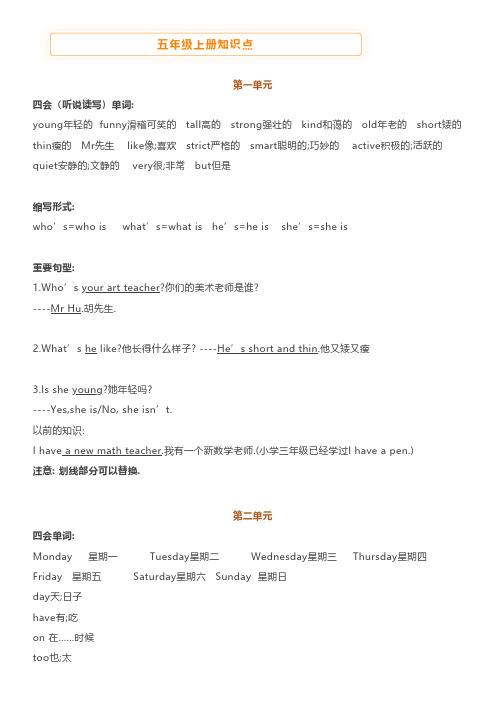
五年级上册知识点短语:do homework 做作业watch TV 看电视read books 读书What about? ......怎么样?do housework 做家务play computer games 玩电脑游戏重点句型:1.What day is it today?今天星期几?—It’s Monday.星期一.2. What do we have on Mondays?星期一我们有什么课?—We have English,science,computer and P.E.我们有英语课,科学,计算机跟体育课.3.What do you do on Saturdays?星期六你干什么?(具体的某一天前用介词on,在具体的时间前,用介词at)—I often do my homework.我通常做家庭作业.4.What about you?你呢?—I do my homework,too.我也是做家庭作业.第三单元四会单词:eggplant 茄子fish 鱼green beans 青豆tofu 豆腐potato 土豆tomato 西红柿for 为;给lunch 中餐;午饭we 我们tasty 好吃的;可口的sweet 甜的sour 酸的fresh 新鲜的salty 咸的favourite 最喜爱的;特别喜爱的fruit 水果grape 葡萄缩写形式:they’re=they are don’t=do not重点句型:1.What would you like for lunch?你午餐想吃什么?-----I’d like some tomatoes and mutton.我想吃一些西红柿跟羊肉.2.What’s your favourite fruit?你最喜欢的水果是什么?------/I like apples.我喜欢苹果.3.I don’t like grapes.我不喜欢葡萄.4.Bananas are my favourite.我最喜欢香蕉.第四单元一. 单词:empty the trash倒垃圾cook the meals 做饭water the flowers浇花sweep the floor扫地clean the bedroom打扫卧室make the bed铺床set the table摆餐具wash the clothes洗衣服do the dishes洗碗碟put away the clothes收拾衣服can’t = cannot(不会;不能)use a computer(使用计算机)二. 句子:1. I’m helpful! I can sweep the floor。
pep五年级英语上册重点单词和句型

pep五年级英语上册重点单词和句型Unit 1 My New Teacher 重点单词和句型 1. --- Who's your Chinese teacher? --- Mr Xiao. 2. --- What's he like? --- He's tall and thin. He's very strict, but he's very funny. 3. --- Is he tall? --- Yes, he is. --- Is he strong? --- No, he isn't. 4. --- Who's your English teacher? --- Miss Li. 5. --- What's she like? --- She's short and thin. She's young. She's kind. 6. --- Is she thin? --- Yes, she is. --- Is she strong? --- No, she isn't. Unit 2 My Days of the Week 重点单词和句型 1. --- What day is it today? --- It's Monday. 2. --- What do you have on Mondays? --- We have Chinese, English, Math and Music. 3. --- What do you do on Saturdays? --- I do my homework. --- What about you? --- I do my homework, too.Unit 3 What's Your Favourite Food? 重点单词和句型 1. --- What do you have for lunch on Mondays? --- We have tomatoes, tofu and fish. 2. --- What's your favourite food? --- Fish. 3. --- What's your favourite fruit? --- I like apples. They're sweet. --- I like fruit. But I don't like grapes. They're sour. Unit 4 What Can You Do? 重点单词和句型 1. --- What can you do? --- I can sweep the floor. 2. --- Can you make the bed? --- No, I can't. --- Can you use a computer? ---Yes, I can. Unit 5 My New Room 重点单词和句型 1. --- What's your room like? --- There is a closet, a shelf, a desk and a bed. 2. --- What's in your flat? --- There are two bedrooms, a kitchen, a bathroom and a living room. 3. --- Where is the closet? --- The closet is near the table. --- Where is the trash bin? --- The trash bin is behind the door. 4. Many clothes are in the closet.Unit 6 In a Nature Park 重点单词和句型 1. --- Is there a forest in the park? --- Yes, there is. --- Is there a river? --- No, there isn't. 2. --- Are there any pandas in the mountain? ---No, there aren't. --- Are there any fish in the rivers? --- Yes, there are.五年级上册句型总揽 Unit 1 My New Teachers 话题:校园生活时态:一般现在时句型: 1. Who,What引导的特殊疑问句,用来对不熟悉的老师进行问答:Who's + 某人?What's he / she like? He / She is + 与身体特征和性格特征有关的形容词。
五年级上册单词及重点句子pep版本

Unit1 My New Teachers句型:This is our new science teacher.Do you have new teachers?Yes, We have a new art teacher.What’s he like? He’s tall and thin .Who’s your art teacher?Mr Hu.必会:young 年轻的funny 滑稽可笑的tall 高的strong 强壮的kind 和蔼的;亲切的old 老的short 矮的thin 瘦的who’s=who is Mr 先生what’s=what is like 像;喜欢he’s=he is strict 严格的smart 聪明的;巧妙的active 积极的;活跃的quiet 安静的;文静的she’s=she is very 很;非常but 但是principal 校长university student 大学生from 从;来自Canada 加拿大know 知道Miss 小姐lady 女士;小姐;夫人so much 很;非常fun 有趣;逗笑Unit2 My Days of the Week句型:What day is it today? It’s Monday.What do we have on Mondays? We have English , math and PE.What do you do on Saturdays?I watch TV ,do my homework and read books.必会:Monday (Mon.)星期一Tuesday (Tue.)星期二Wednesday(Wed.)星期三Thursday(Thu.)星期四Friday(Fri.) 星期五day 天;日子have 有;吃on 在…时候do homework 做作业watch TV 看电视read books 读书Saturday(Sat.) 星期六Sunday(Sun.) 星期日What about…? …怎么样too 也;太Moral Education 思想品德课Social Studies 社会课wait 等等;等待tomorrow 明天often 常常;经常love 爱;热爱yeah 是;行play computer games 玩电脑游戏do housework 做家务Unit3 What’s Your Favourite Food句型:What’s your favourite food? Mutton.What do you have for lunch today? I have eggplant.It’s tasty.I don’t like grapes .They’re sour.I like grapes. They’re fresh.The beef is too salty. I don’t like it.必会:eggplant 茄子fish 鱼green beans 青豆tofu 豆腐potato 土豆tomato 西红柿for 为;给lunch 中餐;午饭we 我们tasty 好吃的;可口的sweet 甜的sour 酸的fresh 新鲜的salty 咸的favourite 最喜爱的;特别喜爱的they’s=they arefruit 水果don’t=do not grape 葡萄cabbage 洋白菜;卷心菜pork 猪肉mutton 羊肉healthy 健康的;有益健康的I’d like=I would like menu 菜单sound 听起来Mew Mew 猫咪;咪咪now 现在have to 不得不eat 吃Unit4 What Can You Do?Can you clean the bedroom?No , I can’t ,but robot can.What can you do at home?I can clean the bedroom. I can cook the meals. I can wash the clothes. cook the meals 做饭water the flowers 浇花sweep the floor 扫地clean the bedroom 打扫卧室make the bed 铺床set the table 摆饭桌;摆餐具wash the clothes 洗衣服do the dishes 洗碗碟can’t=cannot use a computer 使用计算机empty the trashUnit5 My New Room句型:This is my new bedroom.There is a doll on the bed.There are many story-books on the shelf.There iscurtain 窗帘trash bin 垃圾箱closet 壁橱;衣橱mirror 镜子end table 床头柜bedroom 卧室kitchen 厨房bathroom 卫生间living room 客厅;起居室in 在……里面on 在……上面under 在……下面near 在……旁边behind 在……后边clothes 衣服Unit6 In a Nature Parkriver 河流flower 花grass 草lake 湖泊forest 森林path 路;小道park 公园picture 照片house 房子;住宅bridge 桥tree 树road 公路;大道building 建筑物clean 干净的。
(完整)PEP人教版五年级上册英语期末复习默写单词和句子
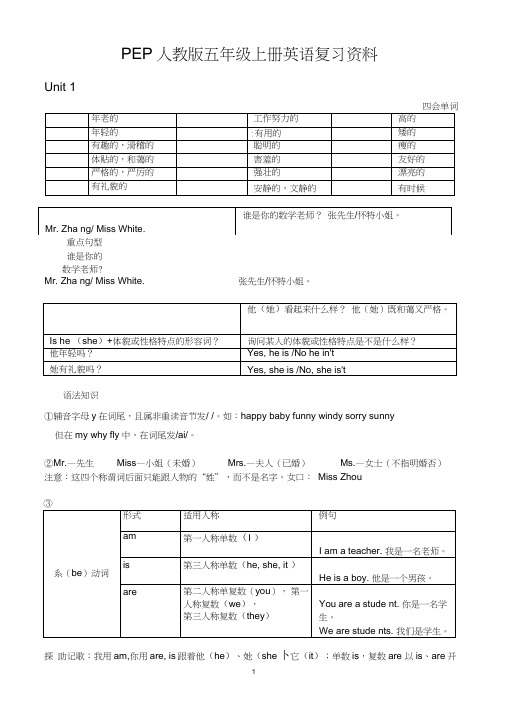
PEP人教版五年级上册英语复习资料Unit 1重点句型谁是你的数学老师?Mr. Zha ng/ Miss White. 张先生/怀特小姐。
语法知识①辅音字母y在词尾,且属非重读音节发/ /。
如:happy baby funny windy sorry sunny但在my why fly中,在词尾发/ai/。
②Mr.—先生Miss—小姐(未婚)Mrs.—夫人(已婚)Ms.—女士(不指明婚否)注意:这四个称谓词后面只能跟人物的“姓”,而不是名字。
女口:Miss Zhou③探助记歌:我用am,你用are, is跟着他(he)、她(she卜它(it);单数is,复数are 以is、are开头的一般疑问句,回答只有Yes或No两种。
—Is he strict? —Yes, he is. / No, he isn't. —Are you Jack? —Yes, I am. / No, I'm not.(注意人称的变化)Unit 2四会单词语法知识①字母组合ee, ea在单词中一般发/i:/。
如:tea green bee sheep see meet read但是在great中发/ei/,在bread中发/e/。
②介词in, on, at +时间,表示在某年或某月(当只有年和月的时候),用in。
如:in May,在五月。
in 2015,在2015年。
表示在某段时间(如在上午,下午,晚上),也用in。
^口:in the morning,in the after noon表示在某日,在星期几时,用on。
女口on Mon day,on Su nday, on the weeke nd表示在几点几分,在具体时间时,用at。
女口at 6:30, at 9 o'clock重点句型语法知识①ow发/au/“奥”的常见单词:cow flower wow dow n how now brow now发/ou “欧”的常见单词:slow snow yellow window tomorrow know探②常考的名词单数变复数:san dwich— san dwiches potato— potatoes tomato—tomatoescarrot—carrots can dy—can dies sheep— sheep重点句型注意主语人称变化:—Can you play the pipa? —Yes, I can. / No, I can'.—Can he play the pipa? —Yes, he can. / No, he cart.—Can your mother play the pipa? —Yes, she can. / No, she cah语法知识①字母ooI. 在字母d和k前发短音/ /。
PEP小学英语五年级上册单词+短语+四会句型+重点语法整理(表格版)
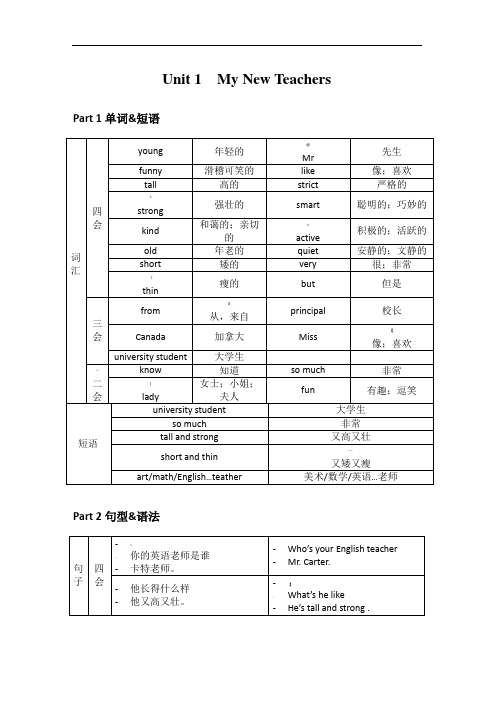
星期一 星期二 星期三
星期四 星期五 星期六 星期日
天;日子
have on
do homework
!
watch TV read books What about…
too
|
有;吃 在…时候 做作业
看电视 读书 …怎么样 也;太
三 会
[
二 会
短语
wait
等等;等待
yeah Moral Education
~
下列单词的形容词形式: salty---salty(咸的) health---healthy(健康的) taste---tasty(好吃 的)
【some & any】 1)some 用于肯定句。但当表示请求、邀请、语气委婉,希望对方得 到对方肯定回答时,可用于疑问句,此时句中常出现情态动词 can, may, could, would. any 用于否定句和疑问句。
描写人的外貌特征的词
如:- What’s your father like 你爸爸长得什么样子
- He is very strong.
]
而在 do like 的句子中,like 的意思是“喜欢”的意思。 如:- What does your father like 你爸爸喜欢什么
- He likes apples. 名词复数
今天是星期几
-— - It’s +表示星期几的词. 星期…
2.询问某一天课程的句型及答语 - What do you have on +表示星期几的词的复数形式
星期…你们有什么课 - We have +课程名称. 我们有…课。
3.询问某一天所做事情的句型及答语
-) - What do you do on +表示星期几的词的复数形式
PEP小学英语五年级上册重点单词和句子(汇编)

Unit 11、告诉朋友我有新换的老师:I have three new teachers. 我有三位新老师。
I have a new math teacher. 我有一位新数学老师。
2、询问陌生人:—Who are they?他们是谁?—A science teacher, an art teacher and an English teacher.一位科学老师,一位美术老师和一位英语老师。
—Who’s that young lady? 那位年轻的女士是谁?—She’s our principal. 她是我们的校长。
3、询问任课教师是谁:—Who’s your art teacher? 你的美术老师是谁?—Mr Hu. 胡先生。
—Who’s your m ath teacher? 你的数学老师是谁?—Mr Zhao. 赵先生。
—Who’s your English teacher? 你的英语老师是谁?—Mr Carter. 卡特先生。
—Who’s your principal? 你们的校长是谁?—Miss Lin. 林小姐。
4、询问任课教师的体貌特征及性格特点,并作出回答:—What’s he like? 他长得什么样?—He’s tall and strong. 他长得又高又壮。
—He’s thin and short. He’s very kind. 他长得又瘦又矮。
他很和蔼可亲。
—Is she quiet? 她很文静吗?—No, she isn’t. She’s very active. 不,不是的。
她很活跃。
—Is she strict? 她很严格吗?—Yes, she is, but she’s very kind.是的,她是,但是她也很和Unit 2询问今天是星期几?1、What day is it today? It's Wednesday.在星期几,你有什么课?2、What do you have on Thursdays?我们有……3、We have English, math and science on Thursdays.在星期几,你做什么?4、What do you do on Saturdays?我做……5、I watch TV on Saturdays.那你呢?6、What about you? I do my homework, too.明天星期几?7、What day is tomorrow? Tomorrow is Thursday.是时候该做某事了。
PEP版小学英语五年级上册知识点汇总(全一册)
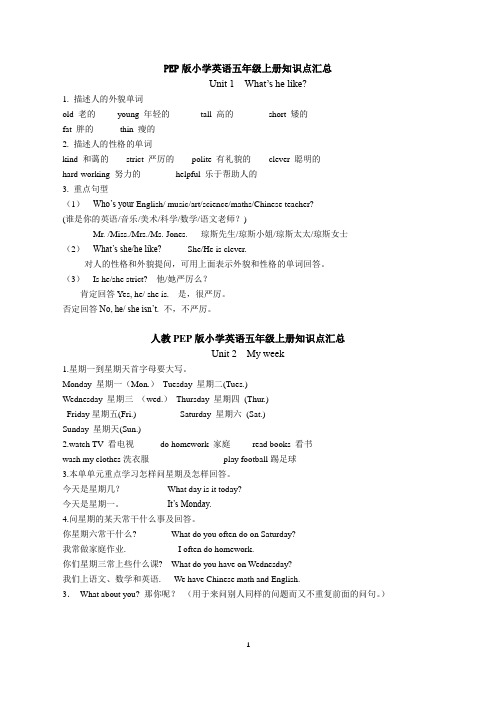
PEP版小学英语五年级上册知识点汇总Unit 1 What’s he like?1. 描述人的外貌单词old 老的young 年轻的tall 高的short 矮的fat 胖的thin 瘦的2. 描述人的性格的单词kind 和蔼的strict 严厉的polite 有礼貌的clever 聪明的hard-working 努力的helpful 乐于帮助人的3. 重点句型(1)---Who’s your English/ music/art/science/maths/Chinese teacher?(谁是你的英语/音乐/美术/科学/数学/语文老师?)---Mr. /Miss./Mrs./Ms. Jones. 琼斯先生/琼斯小姐/琼斯太太/琼斯女士(2)---What’s she/he like? ---She/He is clever.对人的性格和外貌提问,可用上面表示外貌和性格的单词回答。
(3)---Is he/she strict? 他/她严厉么?肯定回答Yes, he/ she is. 是,很严厉。
否定回答No, he/ she isn’t. 不,不严厉。
人教PEP版小学英语五年级上册知识点汇总Unit 2 My week1.星期一到星期天首字母要大写。
Monday 星期一(Mon.)Tuesday 星期二(Tues.)Wednesday 星期三(wed.)Thursday 星期四(Thur.)Friday星期五(Fri.) Saturday 星期六(Sat.)Sunday 星期天(Sun.)2.watch TV 看电视do homework 家庭read books 看书wash my clothes洗衣服play football踢足球3.本单单元重点学习怎样问星期及怎样回答。
今天是星期几?What day is it today?今天是星期一。
It’s Monday.4.问星期的某天常干什么事及回答。
PEP小学英语五年级上册单词和重点句子
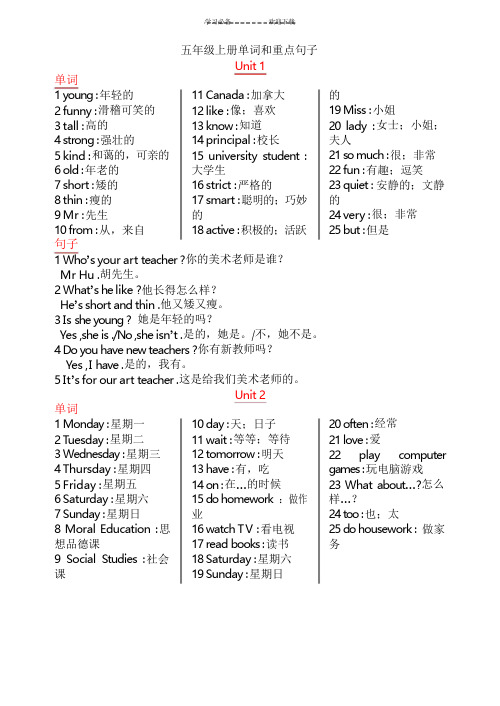
学习必备欢迎下载五年级上册单词和重点句子Unit1单词1young:年轻的11Canada:加拿大2funny:滑稽可笑的12like:像;喜欢3tall:高的13know:知道4strong:强壮的14principal:校长5kind:和蔼的,可亲的15university student:6old:年老的大学生7short:矮的16strict:严格的8thin:瘦的17smart:聪明的;巧妙9Mr:先生的10from:从,来自18active:积极的;活跃句子1Who’s your art teacher?你的美术老师是谁?Mr Hu.胡先生。
2What’s he like?他长得怎么样?He’s short and thin.他又矮又瘦。
3Is she young?她是年轻的吗?Yes,she is./No,she isn’t.是的,她是。
/不,她不是。
4Do you have new teachers?你有新教师吗?Yes,I have.是的,我有。
5It’s for our art teacher.这是给我们美术老师的。
Unit2单词1Monday:星期一10day:天;日子2T uesday:星期二11wait:等等;等待3Wednesday:星期三12tomorrow:明天4Thursday:星期四13have:有,吃5Friday:星期五14on:在…的时候6Saturday:星期六15do homework:做作7Sunday:星期日业8Moral Education:思16watch TV:看电视想品德课17read books:读书9Social Studies:社会18Saturday:星期六课19Sunday:星期日的19Miss:小姐20lady:女士;小姐;夫人21so much:很;非常22fun:有趣;逗笑23quiet:安静的;文静的24very:很;非常25but:但是20often:经常21love:爱22play computer games:玩电脑游戏23What about…?怎么样…?24too:也;太25do housework:做家务学习必备欢迎下载句子1What day is it today?几天星期几?It’s Monday.星期一2What do you have on Mondays?星期一你们有什么课?We have English,science and computer.我们有英语课,科学课和计算机课。
pep人教版小学五年级英语上册各单元知识点归纳

pep人教版小学五年级英语上册各单元知识点归纳最新版人教版小学五年级英语上册复重点知识Unit1 What he like?重点单词: old年老的young年轻的XXX滑稽的kind和蔼的strict严格的polite有礼貌的hard-working工作努力的helpful有用的clever聪明的shy害羞的sometimes有时will将要know知道robot机器人XXX完成he‵s=he is他是who‵s=who is谁是Mr.先生XXX小姐XXX女士重点句子:1、A: Ms Wang will be our new Chinese XXX.XXX使我们新语文老师A: What’s she like?她怎么样?B: She’s very kind?她很和蔼A: Is she strict?她严格吗?B:Yes,sometimes.是的,有时候.2、A: Do you know Mr Young?你认识XXX吗?B: No,I don’t (否认回覆)不,不熟悉。
Yes,I do(一定回覆)是的,我熟悉。
3、A: Who is yourmath XXX?谁是你的数学教师?B: Mr Li李师长教师。
4、A: Is she strict?她严厉吗?B: Yes,sheis.(肯定回答)是的,她严格。
No,XXX.(否定回答),不严格。
Unit2 My week重点单词:XXX星期一XXX星期二XXX星期三XXX星期四Friday星期五Saturday星期六Sunday星期日weekend周末washmyclothes洗衣服watch TV看电视do homework做家庭作业read books读书play football踢足球often通常cooking烹饪tired疲惫的sport体育运动should应该day一天重点句子:1、A:What do you have on Fridays?星期五你有什么课?B:I have a PE class我有体育课2、Do you often play sports?你常常做运动吗?No,I don’t.I don’t like sports不是.我不喜欢做运动3、A: What do we have on Wednesdays ?礼拜三我们都有甚么课?B: We have English、science and XXX.我们星期三有英语、科学和计算机。
pep小学英语五年级上册重点单词与句子

五年级上册Unit1---重点单词:young年轻的,funny滑稽可笑的,tall高的,strong强壮的,kind和蔼的,short矮的,thin瘦的,strict严格的,smart聪明的,active 活跃的,quiet文静的,principal校长,university student大学生重点句子:1.We have a new Chinese teacher.我们有一位新的语文老师。
2.He’s tall and strong.He’s very funny.他又高又壮。
他很滑稽。
3.Who’s your English teacher?谁是你的英语老师?---Mr. Black.4.Her class is so much fun.她的课如此有趣。
5.What’s he like?他长得怎么样?6.He’s thin/short/kind/tall/strict.他很瘦/矮/和蔼/高/严厉。
7.Is she quiet?她文静吗?Unit2---重点单词:Monday(Mon.星期一),Tuesday(Tue.)星期二,Wednesday(Wed.)星期三,Thursday(Thu.)星期四,Friday(Fri.)星期五,Saturday(Sat.)星期六,Sunday(Sun.)星期天,day日子,have吃、有,too 也、太重点词组:do homework做作业,watch TV看电视,read books看书,on Saturdays在星期六的时候重点句子:1.What day is it today?今天星期几?2.It’s Wednesday.今天星期三。
3.What do you have on Thursday?你们星期四有什么课?4.We have English,math and science on Thursday.我们星期四有英语、数学和科学课。
5.What do you do on Saturdays?你星期六做什么?6.I watch TV on Saturdays.我星期六看电视。
PEP小学英语五年级上册第一单元知识点
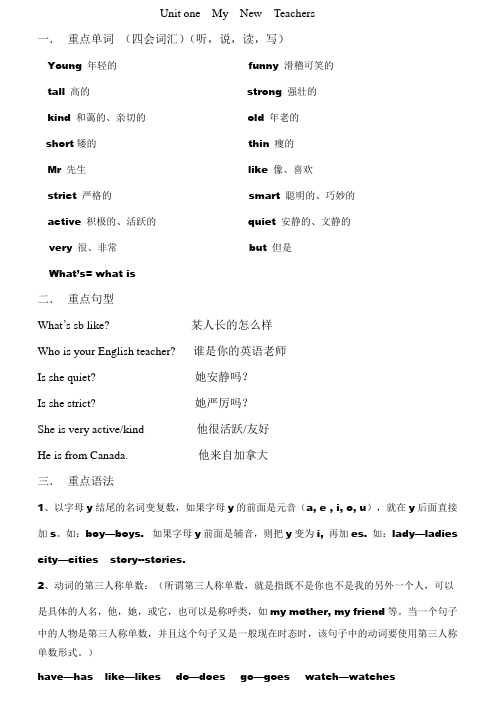
Unit one My New Teachers一.重点单词(四会词汇)(听,说,读,写)Young 年轻的funny 滑稽可笑的tall 高的strong 强壮的kind 和蔼的、亲切的old 年老的short矮的thin 瘦的Mr 先生like 像、喜欢strict 严格的smart 聪明的、巧妙的active 积极的、活跃的quiet 安静的、文静的very 很、非常but 但是What’s= what is二.重点句型What’s sb like? 某人长的怎么样Who is your English teacher? 谁是你的英语老师Is she quiet? 她安静吗?Is she strict? 她严厉吗?She is very active/kind 他很活跃/友好He is from Canada. 他来自加拿大三.重点语法1、以字母y结尾的名词变复数,如果字母y的前面是元音(a, e , i, o, u),就在y后面直接加s。
如:boy—boys. 如果字母y前面是辅音,则把y变为i, 再加es. 如:lady—ladies city—cities story--stories.2、动词的第三人称单数:(所谓第三人称单数,就是指既不是你也不是我的另外一个人,可以是具体的人名,他,她,或它,也可以是称呼类,如my mother, my friend等。
当一个句子中的人物是第三人称单数,并且这个句子又是一般现在时态时,该句子中的动词要使用第三人称单数形式。
)have—has like—likes do—does go—goes watch—watches3、词语变化:fun(形容词形式)――funny funny(名词形式)――fun know(同音词)――nohe(宾格形式)---himshe(宾格形式)——her反义词:tall—short long—short young—old new—old strong—thinkind—strict active—quiet4、be like与do like: 在本单元中,What’s …like?的句型是主句型,这里的like是“像…一样”的意思. What’s …like?是问某某长得什么样子,同学们千万别和like的另一个意思“喜欢”相混了。
英语书五上册单词表
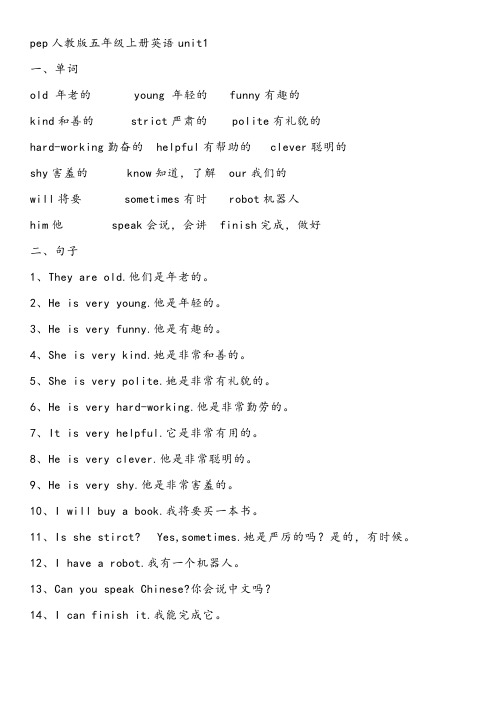
pep人教版五年级上册英语unit1一、单词old 年老的young 年轻的funny有趣的kind和善的strict严肃的polite有礼貌的hard-working勤奋的helpful有帮助的clever聪明的shy害羞的know知道,了解our我们的will将要sometimes有时robot机器人him他speak会说,会讲finish完成,做好二、句子1、They are old.他们是年老的。
2、He is very young.他是年轻的。
3、He is very funny.他是有趣的。
4、She is very kind.她是非常和善的。
5、She is very polite.她是非常有礼貌的。
6、He is very hard-working.他是非常勤劳的。
7、It is very helpful.它是非常有用的。
8、He is very clever.他是非常聪明的。
9、He is very shy.他是非常害羞的。
10、I will buy a book.我将要买一本书。
11、Is she stirct? Yes,sometimes.她是严厉的吗?是的,有时候。
12、I have a robot.我有一个机器人。
13、Can you speak Chinese?你会说中文吗?14、I can finish it.我能完成它。
pep人教版五年级上册英语unit2一、单词Monday星期一Wednesday星期三Thursday星期四Tuesday 星期二Friday 星期五Saturday星期六Sunday星期日weekend周末wash洗watch看read看,读play踢,玩,参加cooking烹饪,烹调 often时常,常常park公园tired疲倦的sport体育运动every每一个,每个day一天,一日schedule工作计划,日程安排二、句子。
1、What do you have on Monday ? 你星期一上什么课?2、What do you do on weekend? 你周末做什么?3、I have to wash my clothes. 我必须洗我的衣服。
人教PEP英语五年级上册重点单词、短语、句型汇总
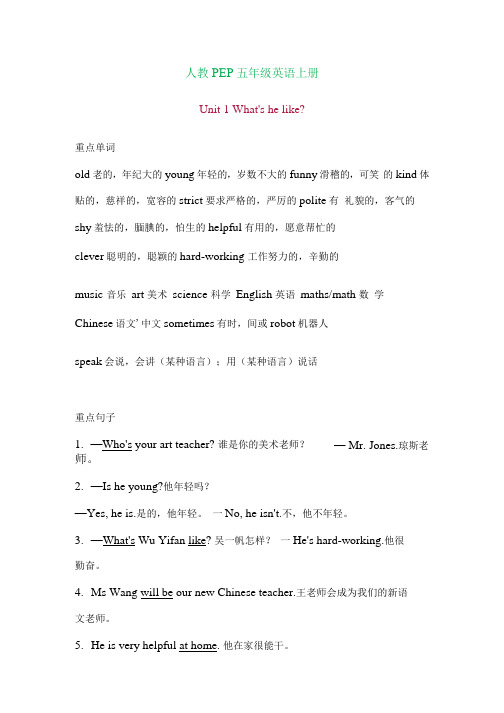
人教PEP五年级英语上册Unit 1 What's he like?重点单词old老的,年纪大的young 年轻的,岁数不大的funny 滑稽的,可笑的kind体贴的,慈祥的,宽容的strict要求严格的,严厉的polite有礼貌的,客气的shy羞怯的,腼腆的,怕生的helpful有用的,愿意帮忙的clever聪明的,聪颖的hard-working 工作努力的,辛勤的music 音乐art 美术science 科学English 英语maths/math 数学Chinese语文'中文sometimes有时,间或robot机器人speak会说,会讲(某种语言);用(某种语言)说话重点句子1.—Who's your art teacher? 谁是你的美术老师?— Mr. Jones.琼斯老师。
2.—Is he young?他年轻吗?—Yes, he is.是的,他年轻。
一No, he isn't.不,他不年轻。
3.—What's Wu Yifan like? 吴一帆怎样?一He's hard-working.他很勤奋。
4.Ms Wang will be our new Chinese teacher.王老师会成为我们的新语文老师。
5.He is very helpful at home. 他在家很能干。
6.Robin is short but strong.罗宾个子矮,但是身体强壮。
7.He can speak Chinese and English. 他会说中文和英语。
8.He makes me finish my homework. 他让我写作业。
语音字母y在单词中的发音:1、双音节或多音节词末发[i]。
例:baby happy windy sunny sorry candy many family party婴儿幵心的有风的晴朗的对不起糖果许多家庭聚会课外补充:2、y在单音节词末发[ai]例:by乘坐my我的why为什么cry哭fly飞重点知识及语法1、询问他人的外貌或性格:-What's he/she like? - He/She is kind/••-2、一般疑问句的问与答:一切he/she..・?—Yes, he/she is. —No, he/she isn't.—Do you know---? —Yes, I do. —No, I don't3、be动词的三种形式am, is, are与人称代词连用的用法:I + am,He, she, it,人名、物名+isWe, you, they + are4、Ms., Miss, Mr., Mrs.的区别:Ms. [miz](缩略词)(用于女子的姓氏或姓名前,不指明婚否)女士;Miss [mis](用于未婚女子的姓氏或姓名前,以示礼貌)小姐,女士;Mr. [mistE] (mister的缩略词)(用于昆壬的姓氏或姓名前)先生;Mrs. [misiz](用于已婚女子的姓氏或姓名前)太太;夫人。
人教版PEP五年级英语上册重要知识点归纳
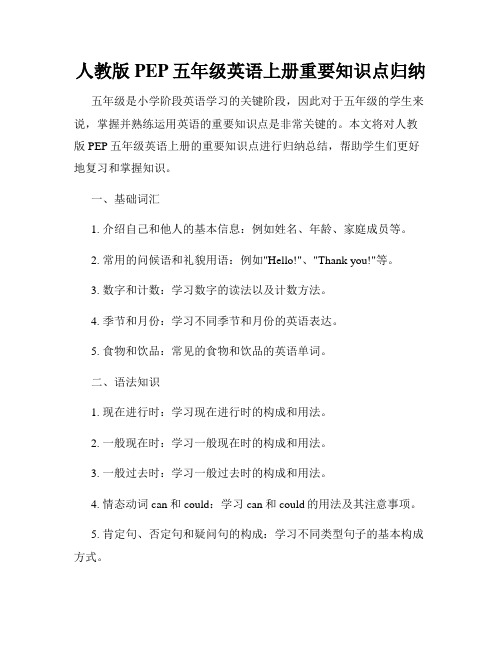
人教版PEP五年级英语上册重要知识点归纳五年级是小学阶段英语学习的关键阶段,因此对于五年级的学生来说,掌握并熟练运用英语的重要知识点是非常关键的。
本文将对人教版PEP五年级英语上册的重要知识点进行归纳总结,帮助学生们更好地复习和掌握知识。
一、基础词汇1. 介绍自己和他人的基本信息:例如姓名、年龄、家庭成员等。
2. 常用的问候语和礼貌用语:例如"Hello!"、"Thank you!"等。
3. 数字和计数:学习数字的读法以及计数方法。
4. 季节和月份:学习不同季节和月份的英语表达。
5. 食物和饮品:常见的食物和饮品的英语单词。
二、语法知识1. 现在进行时:学习现在进行时的构成和用法。
2. 一般现在时:学习一般现在时的构成和用法。
3. 一般过去时:学习一般过去时的构成和用法。
4. 情态动词can和could:学习can和could的用法及其注意事项。
5. 肯定句、否定句和疑问句的构成:学习不同类型句子的基本构成方式。
三、日常用语和交际技巧1. 日常生活用语:学习在生活中常用到的一些英语表达,例如购物、问路等。
2. 与他人交流:学习与他人进行简单交流的技巧,例如如何提问和回答问题等。
3. 听力和口语训练:通过听力和口语训练,提高学生对英语听力和口语的理解和运用能力。
四、阅读和写作能力1. 阅读理解:学习阅读英语短文的技巧,理解短文的内容并回答相关问题。
2. 书写规范:学习书写英文字母和基本的英文单词,提高书写的规范性和准确性。
3. 书面表达:通过写作训练,提高学生的英语书面表达能力。
五、歌曲和游戏1. 学习歌曲:通过学唱英文歌曲,提高学生的英语语感和发音能力。
2. 英语游戏:通过英语游戏的方式,增加学生对英语学习的兴趣和参与度。
六、语音和发音1. 学习国际音标:了解国际音标的基本知识,提高发音的准确性。
2. 发音注意事项:学习一些常见的发音错误及其纠正方法。
以上就是人教版PEP五年级英语上册的重要知识点归纳总结。
- 1、下载文档前请自行甄别文档内容的完整性,平台不提供额外的编辑、内容补充、找答案等附加服务。
- 2、"仅部分预览"的文档,不可在线预览部分如存在完整性等问题,可反馈申请退款(可完整预览的文档不适用该条件!)。
- 3、如文档侵犯您的权益,请联系客服反馈,我们会尽快为您处理(人工客服工作时间:9:00-18:30)。
PEP五年级英语上册重点单词和句子四会单词young年轻的funny滑稽的tall高的strong强壮的kind和蔼的old老的short短的,矮的thin瘦的Mr.先生Like喜欢Strict严格的,严肃的Smart聪明的Active好动的Quiet文静的Very很,非常But但是Monday (Mon.)周一Tuesday (Tue.)周二Wednesday (Wed.)三Thursday (Thu.)周四Friday (Fri.)周五Saturday (Sat.)周六Sunday (Sun.)周日day天have有too也science科学eggplant茄子fish鱼green beans青豆tofu豆腐potato马铃薯.土豆tomato西红柿for为,给lunch午餐we我们tasty美味的,可口的sweet甜的sour酸的fresh新鲜salty咸的favourite喜欢fruit水果grape葡萄curtain窗帘trash bin垃圾篓closet衣柜mirror镜子end table床头柜bedroom卧室kitchen厨房bathroom洗手间living room起居室in在…里面on在…上面under在…下面near在…附近behind在…后面clothes衣服river河流flower花grass草lake湖forest森林path小路park公园mountain高山picture图画照片house房子bridge桥tree树road大路,大道building建筑物clean清洁的,干净的panda熊猫三会单词from 从;来自Canada 加拿大principal 校长university student大学生Miss 小姐wait 等待yeah 是;行play computer gamesI’d like=I would likenow 现在have to 不得不do houseworkput away the clothesempty the trash倒垃圾air-conditioner空调very much很,非常over在…上面in front of 在…前面sky天空cloud云farm农场village小村庄city城市work 工作四会词组do homework做家庭作业watch TV看电视read books读书What about you?你呢?cook the meals烧饭water the flowers浇花sweep the floor扫地clean the bedroom打扫房间make the bed铺床set the table摆餐具wash the clothes洗衣服do the dishes洗碗碟use a computer用电脑四会缩略式who’s = who is what’s = what is he’s = he is she’s = she is they’re = they are don’t = do not can’t = cannot四会句型Who’s your English teacher? Mr.Carter.What’s he like? He’s tall and strong.Is she quiet? No, she isn’t. She’s very active.Is she strict? Yes, she is .B ut she’s very kind.What day is it today? It’s Wednesday.What do you have on Thursdays? We have English, math and science on Thursdays.What do you do on Saturdays? I watch TV on Saturdays.What about you, Mike? I do my homework, too.What do you have for lunch on Mondays? We have tomatoes, tofu and fish.What’s your favourite fruit? I like apples. They’re sweet.I like fruit. But I don’t like grapes. They’re sour.What can you do? I can sweep the floor. I can cook the meals I can water the flowers.Can you make the bed? No, I can’t.Can you use a computer? Yes, I can.There are two bedrooms, a kitchen, a bathroom and a living room.There is a mirror, a bed and a big closet.The closet is near the table.Many clothes are in the closet.The trash bin is behind the door.Is there a forest in the park? Yes, there is./ No, there isn’t.Are there any pandas in the mountains? Yes, there are./ No, there aren’t.PEP五年级下册四会单词词汇表Unit 1do morning exercises(晨练)eat breakfast(吃早饭)have English class(上英语课)play sports(进行体育运动)eat dinner(吃晚饭)when(什么时候)evening(夜晚;晚上)get up(起床)at(在……点钟)usually(通常;noon(中午)climb mountains(爬山)go shopping(购物;买东西)play the piano(弹钢琴)visit grandparents(看望祖父母)go hiking(去远足)weekend(周末)often(经常)sometimes(有时候)Unit 2spring(春天)summer(夏天)fall(秋天)winter(冬天)season季节)which(哪一个)best(最;极)swim(游泳)fly kites(放风筝)skate(滑冰;滑冰鞋)make a snowman(堆雪人)plant trees(种树)why(为什么)because(因为)sleep(睡觉)Unit 3Jan./January(一月)Feb./February(二月)Mar./March(三月)Apr./April(四月)May(五月)June(六月)July(七月)Aug./Augest(八月)Sept./September (九月)Oct./October(十月)Nov./November(十一月)Dec./December(十二月)birthday(生日)uncle(叔叔;舅舅)her(她的)date(日期)Unit 4draw pictures(画画)cook dinner(做饭)read a book(看书)answer the phone (接电话)mom(妈妈)listen to music9(听音乐)clean the room(打扫房间)write a letter(写信)write an e-mail(写电子邮件)grandpa(爷爷;外公)study(书房)Unit 5fly(飞)jump(跳)walk(走)run(跑)swim(游泳)kangaroo(袋鼠)sleep(睡觉)climb(往上爬)fight(打架)swing(荡;荡秋千)drink water(喝水)Unit 6take pictures(照相)watch insects(观察昆虫)pick up leaves(采摘树叶)do an experiment (做实验)catch butterfly(捉蝴蝶)honey(蜂蜜)count insects(数昆虫)collect leaves(收集树叶)write a report(写报告)play chess(下棋)have a picnic(举行野餐)四会句型When do you eat dinner? I eat dinner at 7:00 in the evening.When do you get up? I usually get up at 12:00 at noon.What do you do on the weekend? Usually I watch TV and go shopping. Sometimes I visit my grandparents.What about you? I often play football. Sometimes I go hiking.What’s your favourite season ? My favourite season is springWhich season do you like best ?I like summer best. Why do you like summer? Because I can swim in the lake.Summer is good, but fall is my favourite season.Why do you like winter? Because I can sleep a long time.When is your birthday? It’s in May. My birthday is in June. Uncle Bill’s birthday is in June, too. Is her birthday in June? Yes. What’s the date? June 9th .Hi, John. This is Zhang Peng.What are you doi ng? I’m doing the dishes. I’m reading a book.Grandpa is writing a letter. Brother is doing homework.Mom is cooking dinner in the kitchen. He’s writing an e-mail in the study.What is it doing? It’s eating bananas. What is she doing? She’s jum ping.What are they doing? They’re swimming. They’re climbing trees.Are you eating lunch? No, we aren’t. Are they eating the honey? Yes, they are.Is he playing chess? Yes, he is. Is she counting insects? No, she isn’t.。
